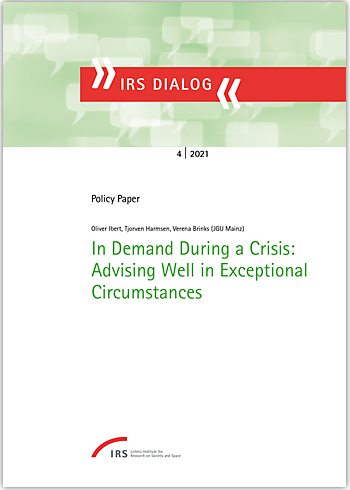Main Content
In Demand During a Crisis: Advising Well in Exceptional Circumstances
IRS Dialog 4 | 2021

Handling crises means, above all, having to make decisions under conditions of existential threat, fundamental uncertainty, and great urgency. Modern crises transgress territorial and disciplinary boundaries, administrative departments, and economic sectors, as well as the boundaries between culture and nature. Elected officials are thus ever more frequently confronted with the limitations of their own knowledge. External expertise can therefore be of assistance in making well-informed decisions before, during, and following a crisis. Dealing with crises is no longer only about averting urgent threats, but also about reflection upon them and, ideally, making changes to prevent their recurrence. It is here that experts can also make their contribution. Where one succeeds in coming out of a crisis stronger than before, one can speak of resilient crisis management.
Unfortunately, there is barely any knowledge about the particularities of crisis consultancy. The following recommendations are intended to prepare experts to act adequately in such exceptional situations. They can serve during times of non-crisis as preparation for tasks ahead or be used for quick orientation when a crisis arises.
Four characteristics of crises are emphasised in crisis-management literature, about which there is broad consensus: threat, uncertainty, urgency, and contingency. Crises are socially constructed, which is to say that they cannot be determined by means of objective criteria or threshold values. What can most probably be objectively established, however, is the broadly shared perception of a situation as one of crisis. In this case, not only the discourse, but also the context for action is altered.
The course of a crisis is divided into three phases. The acute phase, during which the events concerned come thick and fast, is framed by phases before (pre-crisis) and after (post-crisis). The three phases do not correspond directly to the experience of crises – which are usually perceived as occurring quite abruptly by those involved – and are only apparent with hindsight.
Counted as experts are people who have acquired both a reputation within a domain of knowledge and long-term practical experience. Expert status is not an individual quality but presents itself as a position within a network of relationships: (1) in the relationship between consultant and decision maker and (2) through prominent positioning within a knowledge domain. Within these recommendations we distinguish between experts in crises and experts for crises. In the first case, the knowledge domain is itself affected by the crisis, while in the second case it is the subject matter of the domain. These recommendations are especially intended for experts in crises and are intended to help them – and you, our respective readers – to better understand crises and to navigate the pressing circumstances in which advice will be provided.

